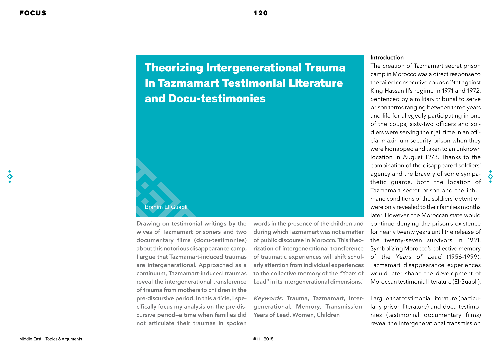Theorizing Intergenerational Trauma in Tazmamart Testimonial Literature and Docu-testimonies
Drawing on testimonial writings by the wives of Tazmamart prisoners and two documentary films (docu-testimonies) about this notorious disappearance camp, I argue that Tazmamart-induced traumas are intergenerational. Approached as a continuum, Tazmamart-induced traumas reveal the intergenerational tr...
Wedi'i Gadw mewn:
| Cyhoeddwyd yn: | Middle East - Topics & Arguments |
|---|---|
| Prif Awdur: | |
| Fformat: | Artikel (Zeitschrift) |
| Iaith: | Saesneg |
| Cyhoeddwyd: |
Philipps-Universität Marburg
2018
|
| Pynciau: | |
| Mynediad Ar-lein: | Mynediad Ar-lein |
| Tagiau: |
Dim Tagiau, Byddwch y cyntaf i dagio'r cofnod hwn!
|
| Crynodeb: | Drawing on testimonial writings by the wives of Tazmamart prisoners and two documentary films (docu-testimonies) about this notorious disappearance camp, I argue that Tazmamart-induced traumas are intergenerational. Approached as a continuum, Tazmamart-induced traumas reveal the intergenerational transference of trauma from mothers to children in the pre-discursive period. In this article, I specifically focus my analysis on the pre-discursive period—a time when families did not articulate their traumas in spoken words in the presence of the children and during which Tazmamart was not a matter of public discourse in Morocco. This theorization of intergenerational transference of traumatic experiences will shift scholarly attention from individual experiences to the collective memory of the “Years of Lead” in its intergenerational dimensions. |
|---|---|
| DOI: | 10.17192/meta.2018.11.7791 |
